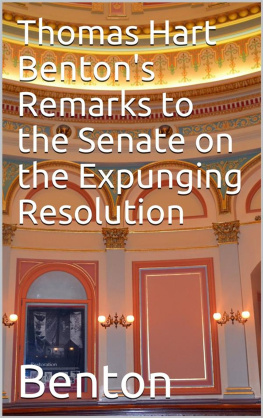Thomas Hart Benton,
"On the Expunging Resolution."
U.S. Senate,
January 12, 1837
Mr. President:
It is now three years since the resolve was adopted by the Senate, which it is my present motion to expunge from the journal. At the moment that this resolve was adopted, I gave notice of my intention to move to expunge it; and then expressed my confident belief that the motion would eventually prevail. That expression of confidence was not an ebullition of vanity, or a presumptuous calculation, intended to accelerate the event it affected to foretell. It was not a vain boast, or an idle assumption, but was the result of a deep conviction of the injustice done President Jackson, and a thorough reliance upon the justice of the American people. I felt that the President had been wronged; and my heart told me that this wrong would be redressed! The event proves that I was not mistaken. The question of expunging this resolution has been carried to the people, and their decision has been had upon it. They decide in favor of the expurgation; and their decision has been both made and manifested, and communicated to us in a great variety of ways. A great number of States have expressly instructed their Senators to vote for this expurgation. A very great majority of the States have elected Senators and Representatives to Congress, upon the express ground of favoring this expurgation. The Bank of the United States, which took the initiative in the accusation against the President, and furnished the material, and worked the machinery which was used against him, and which was then so powerful on this floor, has become more and more odious to the public mind, and musters now but a slender phalanx of friends in the two Houses of Congress. The late Presidential election furnishes additional evidence of public sentiment. The candidate who was the friend of President Jackson, the supporter of his administration, and the avowed advocate for the expurgation, has received a large majority of the suffrages of the whole Union, and that after an express declaration of his sentiments on this precise point. The evidence of the public will, exhibited in all these forms, is too manifest to be mistaken, too explicit to require illustration, and too imperative to be disregarded. Omitting details and specific enumeration of proofs, I refer to our own files for the instructions to expungeto the complexion of the two Houses for the temper of the peopleto the denationalized condition of the Bank of the United States for the fate of the imperious accuserand to the issue of the Presidential election for the answer of the Union.
All these are pregnant proofs of the public will, and the last pre-eminently so: because, both the question of the expurgation, and the form of the process, were directly put in issue upon it.
Assuming, then, that we have ascertained the will of the people on this great question, the inquiry presents itself, how far the expression of that will ought to be conclusive of our action here. I hold that it ought to be binding and obligatory upon us; and that, not only upon the principles of representative government, which require obedience to the known will of the people, but also in conformity to the principles upon which the proceeding against President Jackson was conducted when the sentence against him was adopted. Then everything was done with especial reference to the will of the people. Their impulsion was assumed to be the sole motive to action; and to them the ultimate verdict was expressly referred. The whole machinery of alarm and pressureevery engine of political and moneyed powerwas put in motion, and worked for many months, to excite the people against the President; and to stir up meetings, memorials, petitions, travelling committees, and distress deputations against him; and each symptom of popular discontent was hailed as an evidence of public will, and quoted here as proof that the people demanded the condemnation of the President. Not only legislative assemblies, and memorials from large assemblies, were then produced here as evidence of public opinion, but the petitions of boys under age, the remonstrances of a few signers, and the results of the most inconsiderable elections were ostentatiously paraded and magnified, as the evidence of the sovereign will of our constituents. Thus, sir, the public voice was everything, while that voice, partially obtained through political and pecuniary machinations, was adverse to the President. Then the popular will was the shrine at which all worshipped. Now, when that will is regularly, soberly, repeatedly, and almost universally expressed through the ballot-boxes, at the various elections, and turns out to be in favor of the President, certainly no one can disregard it, nor otherwise look at it than as the solemn verdict of the competent and ultimate tribunal upon an issue fairly made up, fully argued, and duly submitted for decision. As such verdict, I receive it. As the deliberate verdict of the sovereign people, I bow to it. I am content. I do not mean to reopen the case nor to recommence the argument. I leave that work to others, if any others choose to perform it. For myself, I am content; and, dispensing with further argument, I shall call for judgment, and ask to have execution done, upon that unhappy journal, which the verdict of millions of freemen finds guilty of bearing on its face an untrue, illegal, and unconstitutional sentence of condemnation against the approved President of the Republic.
But, while declining to reopen the argument of this question, and refusing to tread over again the ground already traversed, there is another and a different task to perform; one which the approaching termination of President Jackson's administration makes peculiarly proper at this time, and which it is my privilege, and perhaps my duty, to execute, as being the suitable conclusion to the arduous contest in which we have been so long engaged. I allude to the general tenor of his administration, and to its effect, for good or for evil, upon the condition of his country. This is the proper time for such a view to be taken. The political existence of this great man now draws to a close. In little more than forty days he ceases to be an object of political hope to any, and should cease to be an object of political hate, or envy, to all. Whatever of motive the servile and time-serving might have found in his exalted station for raising the altar of adulation, and burning the incense of praise before him, that motive can no longer exist. The dispenser of the patronage of an empire, the chief of this great confederacy of States, is soon to be a private individual, stripped of all power to reward, or to punish. His own thoughts, as he has shown us in the concluding paragraph of that message which is to be the last of its kind that we shall ever receive from him, are directed to that beloved retirement from which he was drawn by the voice of millions of freemen, and to which he now looks for that interval of repose which age and infirmities require. Under these circumstances, he ceases to be a subject for the ebullition of the passions, and passes into a character for the contemplation of history. Historically, then, shall I view him; and limiting this view to his civil administration, I demand, where is there a Chief Magistrate of whom so much evil has been predicted, and from whom so much good has come? Never has any man entered upon the Chief Magistracy of a country under such appalling predictions of ruin and woe! never has any one been so pursued with direful prognostications! never has any one been so beset and impeded by a powerful combination of political and moneyed confederates! never has any one in any country where the administration of justice has risen above the knife or the bowstring, been so lawlessly and shamelessly tried and condemned by rivals and enemies, without hearing, without defence, without the forms of law and justice! History has been ransacked to find examples of tyrants sufficiently odious to illustrate him by comparison. Language has been tortured to find epithets sufficiently strong to paint him in description. Imagination has been exhausted in her efforts to deck him with revolting and inhuman attributes. Tyrant, despot, usurper; destroyer of the liberties of his country; rash, ignorant, imbecile; endangering the public peace with all foreign nations; destroying domestic prosperity at home; ruining all industry, all commerce, all manufactures; annihilating confidence between man and man; delivering up the streets of populous cities to grass and weeds, and the wharves of commercial towns to the encumbrance of decaying vessels; depriving labor of all reward; depriving industry of all employment; destroying the currency; plunging an innocent and happy people from the summit of felicity to the depths of misery, want, and despair. Such is the faint outline, followed up by actual condemnation, of the appalling denunciations daily uttered against this one MAN, from the moment he became an object of political competition, down to the concluding moment of his political existence.












